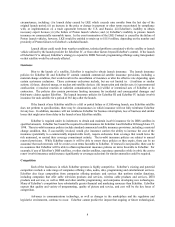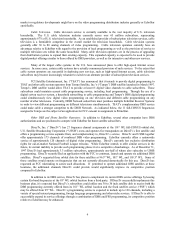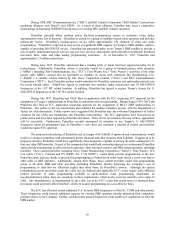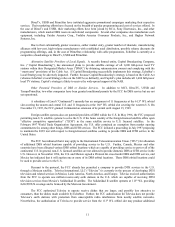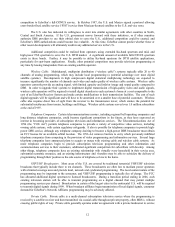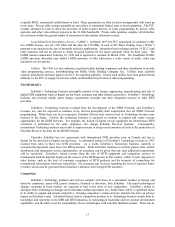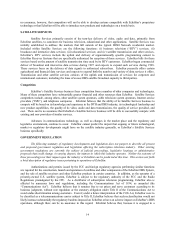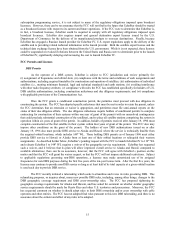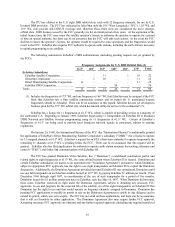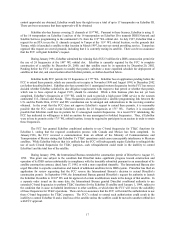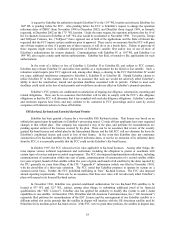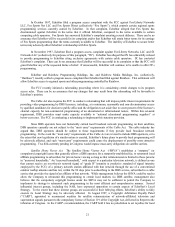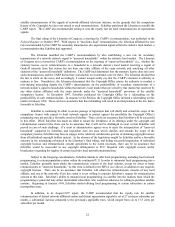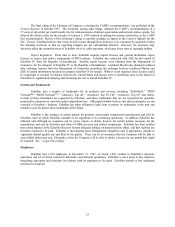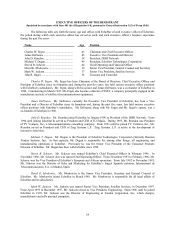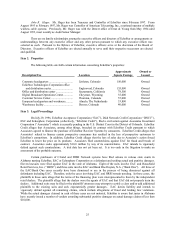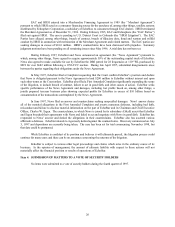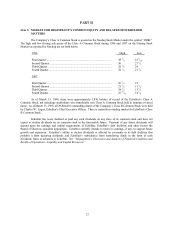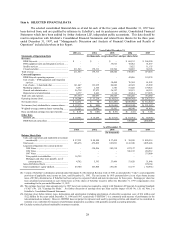Dish Network 1997 Annual Report Download - page 20
Download and view the complete annual report
Please find page 20 of the 1997 Dish Network annual report below. You can navigate through the pages in the report by either clicking on the pages listed below, or by using the keyword search tool below to find specific information within the annual report.18
A request by EchoStar for authority to launch EchoStar IV to the 119° WL location and relocate EchoStar I to
148° WL is pending before the FCC. Also pending before the FCC is EchoStar’s request to change the operation
milestone dates of DBSC (from November 1998 to December 2002), and DirectSat (from August 1999, as formerly
requested, to December 2002) at the 175° WL location. Under the same request, the operation milestone date for 16 of
the 24 channels licensed to EchoStar at 148° WL also would be accelerated to November 1998. Two parties, Tempo
and TelQuest Ventures, Inc. (“ TelQuest”) have opposed one or both of the applications and the State of Hawaii has
requested that the FCC impose certain conditions prior to approval. There can be no assurance that the FCC will grant
any of these requests or that, if it grants any of these requests, it will do so on a timely basis. Failure to grant any of
these requests might result in inefficient deployment of EchoStar’s satellite fleet and/or loss of one of more of
EchoStar’s authorizations for western channels. Communications with EchoStar IV at 119° WL and EchoStar I at
148° WL also require certain earth station authorizations. EchoStar has filed, or intends to file, applications for such
authorizations.
In the event of a failure or loss of EchoStar I, EchoStar II or EchoStar III, and subject to FCC consent,
EchoStar may relocate EchoStar IV and utilize that satellite as a replacement for the failed or lost satellite. Such a
relocation would require prior FCC approval and, among other things, a showing to the FCC that EchoStar IV would
not cause additional interference compared to EchoStar I, EchoStar II or EchoStar III. Should EchoStar choose to
utilize EchoStar IV in this manner, there can be no assurance that such use would not adversely affect EchoStar’s
ability to meet the construction, launch and operation deadlines associated with its permits. Failure to meet such
deadlines could result in the loss of such permits and would have an adverse effect on EchoStar’s planned operations.
EchoStar’s FCC permits are conditioned on satisfaction of ongoing due diligence, construction, reporting and
related obligations. There can be no assurance that EchoStar will be able to comply with the FCC’s due diligence
obligations or that the FCC will determine that it has complied with such due diligence obligations. EchoStar’s permits
and extension requests have been, and may continue to be, contested in FCC proceedings and in court by several
companies with interests adverse to those of EchoStar.
FSS Ka-band, Ku-band and Extended Ku-band Permits
EchoStar has been granted a license for a two-satellite FSS Ka-band system. That license was based on an
orbital plan agreed upon by applicants in EchoStar’s processing round. Certain of these applicants have now requested
changes to that orbital plan. One company has requested a stay of the plan, and petitions for reconsideration are
pending against certain of the licenses covered by the plan. There can be no assurance that review of the recently
granted Ka-band licenses and orbital plan by the International Bureau and the full FCC will not eliminate the basis for
EchoStar’s conditional license and result in loss of that license. In the event that EchoStar does not commence
construction of its Ka-band satellites by the applicable milestone dates, or receive an extension of its milestone dates
from the FCC, it is reasonably possible that the FCC could revoke EchoStar’s Ka-band license.
In October 1997, the FCC released service rules applicable to Ka-band licensees. Among other things, the
rules impose various technical requirements and restrictions, including the obligation to protect or coordinate with
certain types of services and power control requirements. The FCC also imposed implementation milestones, including
commencement of construction within one year of grant, commencement of construction of a second satellite within
two years of grant, launch of first satellite within five years of grant, and launch of all satellites by the dates required by
the ITU generally six years from filing of the ITU “ Appendix 4” information (which was filed in November 1995),
with the possibility of a three-year extension. The FCC noted that EchoStar proposes to operate its system on a
common carrier basis. Further, the FCC prohibited trafficking in “ bare” Ka-band licenses. The FCC also imposed
annual reporting requirements. There can be no assurance that these new rules will not adversely affect EchoStar’s
plans with respect to its licensed Ka-band system.
In November 1996, EchoStar was granted conditional authorization for two Ku-band FSS satellites to be
located at 83° WL and 121° WL, subject, among other things, to submitting additional proof of its financial
qualifications (the “ ESC License” ). EchoStar also has applied for authority to modify this system to add C-band
capabilities to one satellite. In December 1996, PrimeStar and GE American Communications, Inc. (“ GE Americom”)
separately filed petitions for reconsideration of the ESC License and the reassignment of one EchoStar satellite to a
different orbital slot on the grounds that the satellite in dispute will interfere with the GE Americom satellite used by
PrimeStar for its medium-power Ku-band service. If the FCC were to grant these petitions, the satellite in dispute may


